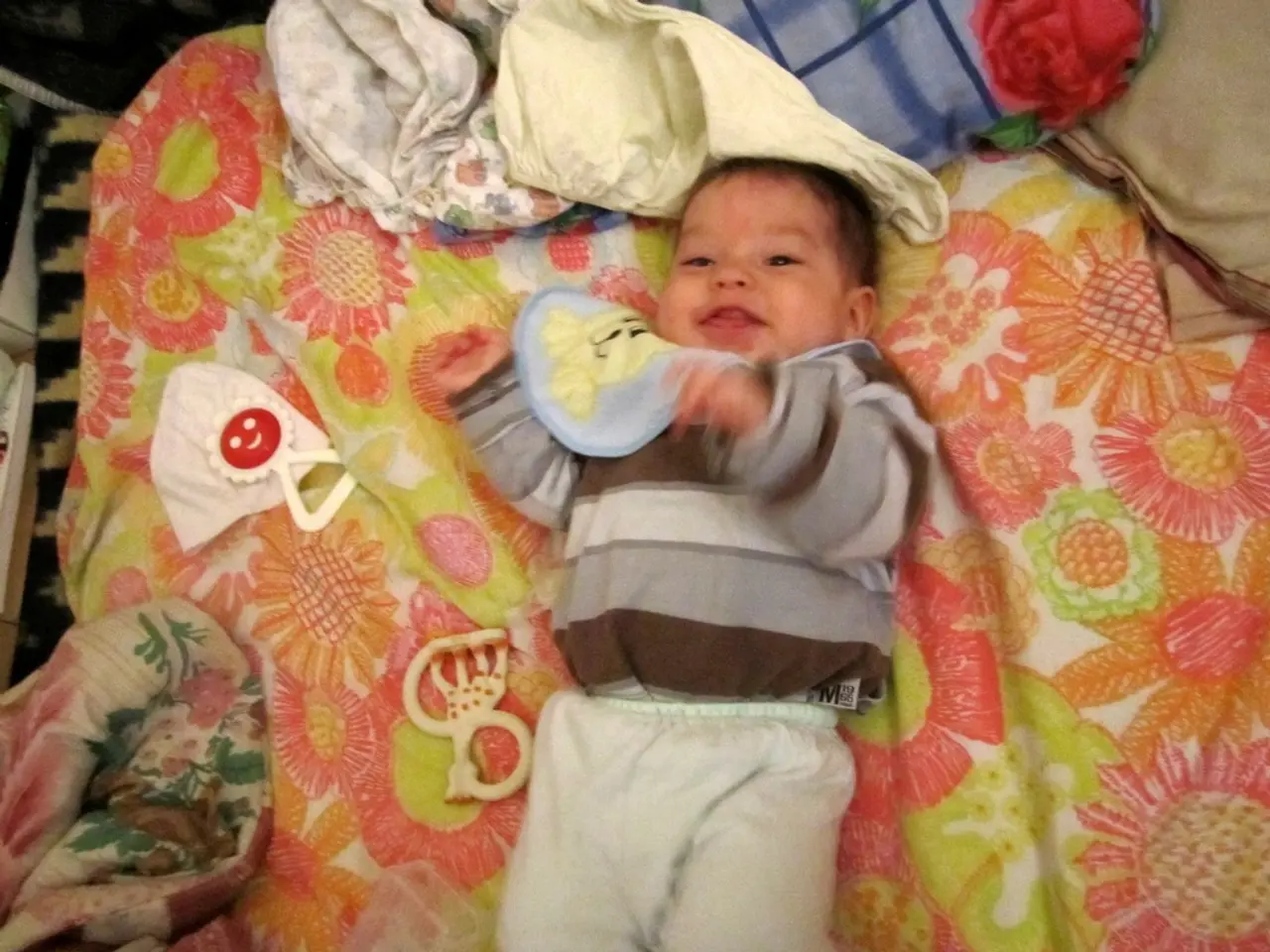Infant Development Milestones Over a Period of 4-6 Months
A Guide to Your Baby's Development: 4-6 Month Milestones
Between the ages of 4 and 6 months, your baby undergoes significant milestones in physical, motor, communication, and social development. Here's a closer look at what to expect during this exciting period.
Physical and Motor Milestones
Gross Motor Skills
At around 4 months, your baby will hold their head steady without support and may begin rolling over from tummy to back, often accidentally during tummy time. By 5 months, they will start rolling front to back and back to front more consistently, marking their first independent movement. Around 7 to 9 months, they will develop the strength to sit unsupported.
Fine Motor Skills
At 4 months, your baby will start reaching for and grabbing objects, improving hand-eye coordination. By 5 to 6 months, they can reach with one hand, shake rattles, and use all fingers in a raking grasp to pick up small objects. Transferring objects between hands will start appearing after 6 months.
Communication and Social Development
Around these months, your baby will smile, coo, and babble more clearly. They will begin interacting with people and objects in new ways, such as tracking faces and sounds with their eyes. They may start responding to their name and can sometimes pause activities when told “no,” showing growing awareness.
Physical Growth and Teeth
Your baby may double their birth weight by 6 months and grow about ½ to ¾ inch each month during this period. The first teeth often begin to appear around 6 months.
Parental Support for Growth
To support your baby's development, encourage tummy time daily to strengthen neck, shoulder muscles, and facilitate motor skill development. Provide safe toys that encourage reaching and grabbing to develop fine motor skills. Engage your baby with talking, singing, and responding to their sounds to support early speech and social skills. Create a safe environment, especially as rolling begins, by avoiding elevated changing surfaces and stopping swaddling when rolling signs appear. Monitor teething and maintain good oral hygiene, avoiding bottles in bed to prevent cavities. Offer supported sitting opportunities with pillows or in your lap to build core strength necessary for independent sitting later.
Feeding Your Growing Baby
Start by offering small amounts of pureed or mashed foods, such as fruits and vegetables, when introducing solid foods. Look for signs of readiness, such as good head control, sitting upright with support, and showing an interest in food by reaching for it, before introducing solid foods. Breast milk or formula should still be the primary source of nutrition until the first birthday. Offer a variety of foods from all food groups, including fruits, vegetables, whole grains, protein, and dairy products, to ensure proper nutrition. Avoid adding salt, sugar, or honey to your baby's food, as their kidneys and digestive systems are still developing.
Sleeping Tips for Your Baby
Establish a consistent bedtime routine to regulate your baby's sleep pattern. Start by creating a routine with calming activities such as a warm bath or gentle massage. Keep the room dark, quiet, and at a comfortable temperature. Offer extra soothing techniques like gentle rocking or a pacifier if needed during sleep regressions. Ensure a comfortable sleep environment with a crib or bassinet that meets safety standards. Avoid using blankets, pillows, or stuffed animals that can pose suffocation risks.
Remember, each baby develops uniquely, so parents should observe their own child’s progress while providing supportive and stimulating experiences suited to their developmental stage. If sleep issues persist or become a cause for concern, consult with a pediatrician.
- During the 4-6 month development stage, your baby's emotional development progresses as they smile, coo, and babble more, demonstrating growing awareness.
- To promote your baby's health and wellness, parents should limit screen time and provide a balanced diet rich in nutrients for the kid's mental-health and physical development.
- As part of the bedtime routine, parents can engage in health-and-wellness activities like a warm bath or gentle massage to help regulate their baby's sleep pattern.
- For the baby's emotional development, parents should interact with their child during tummy time, talking, singing, and responding to their sounds.
- Breastfeeding remains crucial for your baby's nutrition up to their first birthday, while at the same time, parents should introduce mashed foods for the baby's growth.
- For parenting support, parents can monitor screen time, offer nutritious foods, and maintain a safe environment by avoiding elevated changing surfaces and using cribs or bassinets meeting safety standards.
- As rolling begins, parents should create a safe environment for their baby by stopping swaddling and avoiding suffocation risks from blankets, pillows, or stuffed animals.
- To ensure healthy behavior, parents should encourage mental-health activities like reading, playing, or puzzle-solving, while providing a supportive and stimulating environment adapted to their baby's developmental stage.




